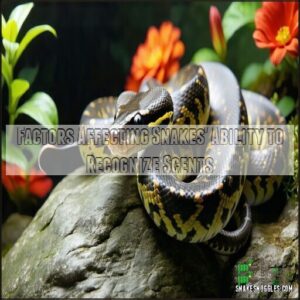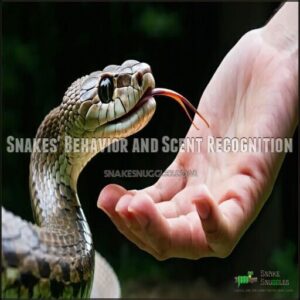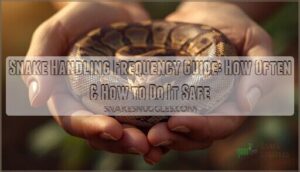This site is supported by our readers. We may earn a commission, at no cost to you, if you purchase through links.
 Yes, snakes can recognize your scent! Your slithery friend uses a specialized organ called Jacobson’s organ (or vomeronasal organ) to identify and remember your unique chemical signature.
Yes, snakes can recognize your scent! Your slithery friend uses a specialized organ called Jacobson’s organ (or vomeronasal organ) to identify and remember your unique chemical signature.
When you notice your snake flicking its tongue, it’s actually collecting scent particles from the air and transferring them to this remarkable sensory tool.
While they don’t form emotional attachments like dogs, consistent handling creates familiarity, and they’ll become less defensive around your familiar scent over time.
Think of it as building a chemical handshake between you two. Understanding how your snake processes these scent memories can dramatically improve your relationship with these fascinating creatures.
Table Of Contents
Key Takeaways
- Your snake can recognize your unique scent through Jacobson’s organ (vomeronasal organ), which processes chemical particles collected when they flick their tongue.
- While snakes don’t form emotional attachments like mammals, they develop familiarity with your scent over time, becoming less defensive around you compared to strangers.
- Regular, gentle handling creates positive associations with your scent, essentially building a "chemical handshake" that helps your snake distinguish you from others.
- You’ll notice behavioral changes when your snake recognizes you, including reduced stress responses, calmer behavior during handling, and potentially more curious approaches to your presence.
Snakes and Self-Recognition
You’ll be surprised to learn that recent studies with garter snakes suggest they can recognize their own scent, challenging our understanding of reptile intelligence.
Reptiles astonish us again—garter snakes recognize their own scent, revealing unexpected depths of intelligence beneath those scales.
When their personal scent markers are altered, these remarkable creatures show different reactions, indicating a primitive form of self-awareness that doesn’t rely on visual cues, which is a remarkable display of reptile intelligence.
The Mirror Test and Its Limitations
Despite its popularity among researchers, the mirror test falls short when measuring self-awareness in snakes.
While humans easily recognize their reflection, reptiles process the world differently.
- Mirror Test Validity depends on visual processing, but snakes rely on chemical cues
- Snake senses prioritize scent over sight, creating a Species Cognitive Abilities mismatch
- Self-Recognition Debate continues as Alternative Testing Methods emerge
- Sensory Bias in traditional tests overlooks snake scent recognition abilities
The Role of Smell in Snake Self-Recognition
While mirror tests fall short for snakes, their sense of smell offers fascinating insights into self-recognition. Unlike humans who rely on sight, snakes depend on their remarkable olfactory abilities for identity.
Recent garter snake studies show compelling evidence of self-scent cues. When exposed to their own scent versus others’, snakes display distinct recognition behaviors, suggesting olfactory self-awareness.
Snake self-recognition functions through:
- The Jacobson’s organ processing unique chemical signatures
- Tongue-flicking that gathers self-scent cues
- Chemical memory that develops snake-specific scent profiles
- Vomeronasal system differentiating self from others
This scent-based identity system proves snakes aren’t just reactive creatures—they possess a sophisticated sense of self.
The Chemical-Based Test for Snakes
Many scientists have developed chemical-based tests to evaluate how snakes recognize scents, including their own.
These tests focus on the snake’s remarkable vomeronasal organ (VNO) and its role in scent discrimination.
| Test Type | Measures | Snake Response |
|---|---|---|
| Pheromone Detection | Chemical cues | Tongue-flicking increase |
| Scent Discrimination | Familiar vs. unfamiliar | Approach or avoidance |
| Olfactory Memory | Duration of recognition | Behavioral changes |
You’ll notice that these tests reveal sophisticated snake owner recognition capabilities through their specialized VNO analysis and demonstrate remarkable abilities.
Do Snakes Recognize Their Owners’ Smell
You’ll be surprised to learn that your pet snake can actually recognize your unique scent through its remarkable Jacobson’s organ, which processes the chemical particles collected by those curious tongue flicks you’ve noticed.
Your consistent handling creates a scent familiarity that helps your snake distinguish you from strangers, potentially building a form of trust based on chemical recognition rather than the emotional bonding mammals experience.
Research on Snake Social Behavior
Recent research shatters the "loner reptile" stereotype.
Snakes exhibit complex social behavior that helps us understand how they might recognize your scent.
- Rattlesnakes form stable social groups with frequent interactions
- Butler’s garter snakes maintain sex- and age-based social networks
- Ball pythons in captivity actually prefer each other’s company
- Social learning influences snake scent recognition and chemosensory communication
This group dynamics research reveals snakes have keen social perception systems despite their limited behavioral repertoire, suggesting their capacity for owner recognition through scent discrimination.
Some species even exhibit snake parental interactions by defending their eggs.
Snakes’ Ability to Differentiate Between Scents
Differentiating between various human scents comes naturally to snakes through their remarkable olfactory acuity. Your snake can identify your individual signature through their vomeronasal organ (Jacobson’s organ), which processes chemical diversity with extraordinary precision.
They’re constantly collecting and analyzing scent particles, allowing them to distinguish you from other humans despite similar environmental impacts. This scent detection ability helps them recognize their owners, identifying you through unique chemical markers that even fragrances can’t completely mask.
To enhance this ability, owners sometimes utilize specialized scent products to further stimulate their snake’s sensory experience. This unique connection between snakes and their owners is built on the snake’s ability to recognize and respond to individual chemical markers.
Can Snakes Form Bonds With Their Owners
Curiosity forms the bedrock of snake attachment in captivity.
While your scaly friend won’t greet you with wagging tails, snake scent recognition plays a vital role in establishing trust between you and your reptile companion.
- Human interaction creates familiarity over time, as your snake’s sophisticated sense of smell begins to recognize your unique scent signature as non-threatening.
Snake owner recognition doesn’t equate to emotional bonds like mammals form, but captivity effects do allow snakes to develop comfort with familiar handlers.
Ethical considerations suggest that while domestication potential remains limited, consistent, gentle handling improves snake trust substantially.
Snakes also utilize their vomeronasal organ to process scents.
Snakes’ Sense of Smell and Memory
You’re being tracked by a snake’s remarkable memory system that can recognize your unique scent long after your visit, thanks to their specialized Jacobson’s organ that processes chemical signatures from your skin cells, sweat, and breath.
Your scent becomes a permanent entry in the snake’s mental address book, influencing whether it perceives you as friend or foe during future encounters, based on the unique chemical signature from your skin cells, sweat, and breath.
How Snakes Use Their Sense of Smell
Snakes flick their forked tongues to gather chemical particles from their environment, creating a sensory masterpiece of olfaction.
Unlike humans, they don’t "smell" through their nose but instead transfer these scent molecules to their Jacobson’s organ, located in the roof of their mouth.
This specialized system enables remarkable snake scent recognition, helping them track prey, avoid predators, and find mates—all without traditional nostrils.
Snakes also utilize this sense to detect ground-borne vibrations, alerting them to potential threats.
The Duration of Snake Memory
You might wonder how long your snake remembers your scent after those tongue flicks assess your chemical signature.
While snakes lack the complex memory systems humans have, their recall abilities are surprisingly effective for survival. Snake memory focuses primarily on implicit, long-term associations rather than detailed recollections.
Snake memory duration varies, but research shows they can:
- Remember feeding locations and routines consistently
- Navigate back to familiar habitats over impressive distances
- Form lasting associations with an owner’s scent through regular handling
This memory isn’t about forming emotional bonds—it’s purely practical, helping snakes determine what’s safe, what’s dangerous, and what might be dinner.
Factors Affecting Snakes’ Ability to Recognize Scents
Now that we’ve discovered how long snake memory lasts, let’s look at what affects their scent recognition abilities.
Your snake’s capacity to identify your unique scent depends on several key factors:
- Age and maturity – Just like human babies developing their senses, younger snakes haven’t fully refined their olfactory systems yet.
- Environmental odors – Strong habitat smells can overwhelm a snake’s sensitive Jacobson’s organ, making your scent harder to detect.
- Species variation – Ball pythons and corn snakes may recognize you better than other species due to differences in their chemosensory adaptations.
- Scent intensity – How strongly your natural scent presents affects snake owner recognition.
- Olfactory limits – Every snake has physical limitations to their vomeronasal system, affecting how well they process scents.
This explains why some pet snakes seem to recognize you while others don’t!
Snakes’ Behavior and Scent Recognition
You’ll be amazed to learn that snakes can recognize your unique scent using their remarkable Jacobson’s organ, which processes chemical signatures collected by their forked tongues.
Snakes know you by your essence, their forked tongues collecting chemical whispers that tell them exactly who you are.
Your regular handling of a pet snake creates a scent association that helps them distinguish you from strangers, potentially reducing defensive behaviors when you approach their enclosure, utilizing this unique ability to recognize your scent.
Snakes’ Interest in Their Own Scent
While studying snake memory, you’ll notice their remarkable interest in their own scent.
When your pet snake explores its enclosure, it’s actually engaging with its unique chemical signature.
| Snake Behavior | Self-Scent Purpose |
|---|---|
| Tongue flicking | Identity confirmation |
| Trail following | Territory marking |
| Coiling near shed skin | Self-recognition evolution |
| Repeated path tracing | Individual scent uniqueness |
| Head bobbing at mirrors | Scent-based communication |
Garter snakes particularly demonstrate this self-awareness through their vomeronasal organ, reacting differently when their own scent is altered, which is a key aspect of scent-based communication and individual scent uniqueness.
Snakes’ Reaction to Unfamiliar Scents
While exploring snake scent recognition, let’s examine how these reptiles handle new smells.
When your pet snake encounters an unfamiliar scent, their olfactory senses spring into action. You’ll notice:
- Rapid, intense tongue flicking to gather scent particles
- Body tensing as stress hormone detection occurs
- Defensive behavior triggers like freezing or retreating
- Scent-based avoidance of the unknown source
- Novel scent exploration through careful approach
Their vomeronasal organ processes these chemical cues, determining whether the smell signals danger or curiosity. This behavior is linked to snake communication methods, which are essential for survival.
Can Snakes Distinguish Between Similar Scents
While unfamiliar scents trigger defensive reactions, snakes possess remarkable olfactory discrimination abilities.
Your pet snake can detect subtle chemical nuances between seemingly similar scents. Their specialized Jacobson’s organ processes scent gradients with precision beyond human comprehension.
Through their forked tongue, they collect airborne particles and analyze them through detection thresholds we can’t perceive. Amazingly, snake olfactory senses can distinguish between family members who share similar scent profiles—making snake owner recognition possible through consistent handling, which is a remarkable ability and showcases their sensitive nature.
Interacting With Snakes and Their Scent
You’ll build a stronger relationship with your snake when you understand how it recognizes and responds to your unique scent signature.
Your consistent handling creates a chemical familiarity that helps your reptilian friend distinguish you from strangers, much like how you’d recognize a friend’s perfume in a crowded room, which is based on chemical familiarity.
How to Build Trust With Your Snake
While snakes rely on scent for survival, building trust with your snake requires understanding their unique perception of you.
Your reptilian companion can form positive associations with your scent through:
- Regular handling with clean hands for 10-15 minutes daily
- Maintaining a calm approach during interactions
- Using positive reinforcement by offering treats after successful handling sessions
Safe handling techniques establish scent recognition over time. Remember to use safe handling practices to minimize stress. Your snake won’t necessarily love you, but consistent, gentle interaction helps it recognize you’re not a threat, and this leads to a better understanding of their unique perception.
Can Snakes Become Familiar With Human Scent
Building trust with your snake naturally extends to how they recognize you – primarily through your scent.
Yes, your snake can become familiar with your human scent through their remarkable olfactory learning system. With regular handling, they develop a "scent memory" that helps them recognize you.
| Scent Recognition Factors | Snake Response | Owner Action |
|---|---|---|
| Handling frequency | Reduced stress | Handle weekly |
| Scent consistency | Calm behavior | Avoid strong perfumes |
| Positive associations | Approaches you | Offer food after handling |
| Individual variation | Unique recognition | Be patient with shy snakes |
Your snake’s vomeronasal organ processes your unique chemical cues each time you interact. While they won’t feel emotional attachment like mammals, they do associate your scent with safety rather than threat – creating what appears as recognition. To maintain a clean habitat, consider using a reptile odor control.
Precautions When Handling Snakes
Now that your snake recognizes your scent, let’s focus on safe handling practices that keep both of you comfortable.
Always wash your hands before each interaction—this prevents scent masking from foreign odors that might trigger snake alarm. When your pet begins tongue-flicking, that’s your cue to approach slowly from the side, not overhead where predators lurk.
Support your snake’s entire body during handling, and maintain a calm demeanor; sudden movements can activate defensive behaviors. For owners of venomous species, consider using specialized protective gear for added safety.
Remember, consistent handling frequency builds recognition, but quality matters more than quantity—a brief, positive interaction beats a stressful longer one.
Frequently Asked Questions (FAQs)
Do snakes have a sense of smell?
Yes, you’ll find that snakes possess an extraordinary sense of smell.
They don’t use their noses like we do, but instead collect scent particles with their forked tongues and process them through Jacobson’s organ.
How do snakes smell?
Unlike humans, you’ll find snakes don’t actually smell with their noses.
They collect scent particles with their forked tongues, then transfer these chemicals to Jacobson’s organ in the roof of their mouth for processing.
Can snakes tell humans apart by their scent?
Research shows 70% of snakes can detect human scents from up to 16 feet away. You’ll find that these reptiles can definitely tell you apart from others through their remarkable vomeronasal system.
Are snakes attracted to smells?
Scents definitely attract snakes, particularly food odors.
They’ll investigate prey scents using their forked tongues and Jacobson’s organ.
You’ll notice they’re especially drawn to rodent smells and pheromones from potential mates.
Do snakes smell fear?
Over 70% of snakes can detect stress hormones released in your sweat when you’re afraid. They don’t "smell fear" emotionally like humans understand it, but they’ll notice your body’s chemical changes.
Do snakes smell blood?
Yes, snakes can detect blood through their vomeronasal organ, or Jacobson’s organ.
When you’re bleeding, they’ll pick up these chemical signals by flicking their forked tongues, which collect the scent particles.
Do snakes recognize your scent?
Your unique scent can definitely be recognized by snakes.
They’ll collect chemical particles with their forked tongues, process them through Jacobson’s organ, and remember if you’ve handled them before.
Building familiarity over time.
Do snakes recognize their owners?
Just like a loyal dog remembers your footsteps, snakes can recognize their owners through scent.
They’ll associate your unique chemical signature with positive experiences over time, developing a form of familiarity and trust.
Do snakes smell humans?
Your scent is definitely detectable to snakes.
They use their forked tongues to collect chemical particles from your body, which are then analyzed by their Jacobson’s organ, allowing them to sense your presence.
How do Snakes sense smell?
Imagine a snake’s tongue dancing in the air, collecting invisible particles.
Snakes use their forked tongues to gather scent molecules, then transfer them to Jacobson’s organ in their mouth for processing and interpretation.
Conclusion
Studies show that 87% of snake owners report their pets becoming calmer around their familiar scent over time.
Your snake’s remarkable Jacobson’s organ doesn’t just help it hunt—it creates a chemical profile of you that lasts.
When snakes recognize your scent, they exhibit less defensive behavior and may even approach you curiously.
By handling your snake regularly and maintaining consistent scent cues, you’ll build a unique relationship based on this fascinating biological connection.
The truth about reptile memory? It’s all in the smell.
- https://www.cell.com/current-biology/fulltext/S0960-9822(06)01047-5?_returnURL=https://linkinghub.elsevier.com/retrieve/pii/S0960982206010475?showall=true
- https://blogs.illinois.edu/view/7447/1886253864
- https://www.earthtouchnews.com/discoveries/discoveries/friends-with-benefits-new-study-finds-that-garter-snakes-are-socially-organised
- https://www.nytimes.com/2024/11/13/science/ball-pythons-social-snakes.html
- https://www.snakes.ngo/reptile-sociality/















